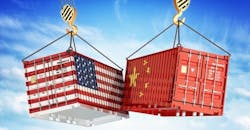'We Did What We’re Supposed to Do,’ but with Tariffs, They’re Reeling
With tighter profit margins and fewer employees to cut, smaller manufacturing operations tend to feel the vibrations of an unstable market first. If the experience of Wolverine Advanced Materials is any indication, the steel and aluminum tariffs and uncertainty around NAFTA have already put some auto suppliers on shaky ground—and a third blow from proposed Section 232 auto and automotive parts tariffs could be a coffin nail for some smaller operations.
Wolverine, a Michigan-based manufacturer of performance-enhancing brake and sealing materials, has more than doubled its workforce since the Great Recession and diversified its offerings and their global reach. But recent months, the 85-year-old company, which was acquired by ITT Inc. in 2015, has had to make “drastic reductions” to its workforce because of the tariffs and now worries about its survival.
Wolverine has laid off 17% of its U.S. workforce since March 2018, and then cut an additional 19% of its U.S. workers in September. Its whittled workforce now stands at 310 U.S. employees, of a total of 510 worldwide.
Brian Knox, vice president of global sales at Wolverine, said at a Motor & Equipment Manufacturers Association (MEMA) forum on Oct. 23 that his company was hit hard by the 25% tariffs on imported steel that went into effect in March 2018.
“What we’ve seen from tariffs is commodity pricing escalating drastically,” Know said. “It’s no longer making us competitive. We’re seeing upwards of 30% higher prices in the U.S. for steel compared to Europe, and north of 40% higher than Asia.”
That, combined with uncertainty around ongoing NAFTA negotiations, has wreaked havoc on Wolverine’s bottom line. With two-thirds of the company’s business overseas but most of its employees in the U.S., “we are drastically non-competitive now,” Knox said.
Knox was one of four panelists at the MEMA forum discussing the potential impact of the Trump administration’s proposed Section 232 tariffs on imported auto parts and autos. President Donald Trump has self-imposed a deadline of November 14 to decide whether to enact the tariffs, and to what degree.
Knox said the business environment today is the worst he’s seen in his 13 years at Wolverine.
“There’s just a multitude of factors that we’re dealing with,” he said. “It all comes down to competitiveness. With the headwinds that we’re seeing, from commodity prices to reactions from global economies, it’s a challenge.
“At the end of the day, we’re an American company. We did what we were supposed to do: We’re a U.S. company that supplies product to the world. And whether you like it or not, in today’s environment, we’re having to let go of American workers. And I can’t provide a good answer as to why that should be that way.”
About the Author

Laura Putre
Senior Editor, IndustryWeek
As senior editor, Laura Putre works with IndustryWeek's editorial contributors and reports on leadership and the automotive industry as they relate to manufacturing. She joined IndustryWeek in 2015 as a staff writer covering workforce issues.
Prior to IndustryWeek, Laura reported on the healthcare industry and covered local news. She was the editor of the Chicago Journal and a staff writer for Cleveland Scene. Her national bylines include The Guardian, Slate, Pacific-Standard and The Root.
Laura was a National Press Foundation fellow in 2022.
Got a story idea? Reach out to Laura at [email protected]
